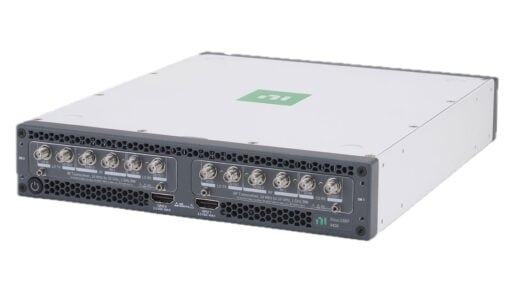Depending on the properties of the printing media and the structures to be dispensed, users can choose from a variety of established dispensing valves, like jet valves, time-pressure valves, or screw dispensing systems. Each valve sits on a separate vertical axis.
Since the dispensing heads can be operated in parallel, it is possible to combine different liquid materials in one printing process. Linear axes and integrated real-time control ensure maximum dispensing precision. The segmentation of the structure and the segments’ allocation to the different dispensing valves are stored in the STL model and correctly implemented in the dispensing pattern by the slicer software. A camera moving along with the robot head detects the exact dispensing position while simultaneously calibrating the dispensing system.
Reliable printing of functional structures
For the production of multi-material designs, it is not only the system’s precision that is crucial, but also the materials used. During the printing process on the Infotech system, the materials are applied in liquid form and then cure under UV light. The effective thickness of the applied layer is determined by a non-contact height measurement.
This allows the working distances of the dispensing units to be dynamically corrected if necessary. For curing, the UV lamp head mounted in the system travels along the contour dispensed last, helping the material to immediately reach its final strength.
The distinctive feature of DELO’s liquid materials is their suitability for combination and their functional character. Having similar chemical properties, the printing materials build up very good adhesion to each other and show isotropic properties in all printing directions when cured. They also offer functions like transparency, conductivity, or flexibility.
DELO’s resins can be used to reliably print components that have different functions – for example, components with fixed and flexible areas or with transparent and black areas. Structures with wall thicknesses of less than 500µm can be produced just as easily as complex structures with overhangs or undercuts.
Fully automatic system for integration into existing production lines
The entire dispensing and curing process is fully automatic, as is the cleaning of dispensing needles or flat nozzles. Cleaning can be performed as required, either after a certain number of cycles or components are used, or after a defined amount of time.
The new system, which was developed based on the proven IP-500 Desktop Dispenser, can be used as a standalone system. The identical machine configuration can be easily adapted to in-line dispensing cells. In the flexible, modular system, DELO devices, like jet valves and LED curing lamps, can also be used.
The system is suitable for prototype development and small-series production. Typical areas of application for such components printed with DELO materials include the automotive and microelectronics industries, as the materials are highly resistant to temperature and media and have properties similar to those of high-performance plastics.







